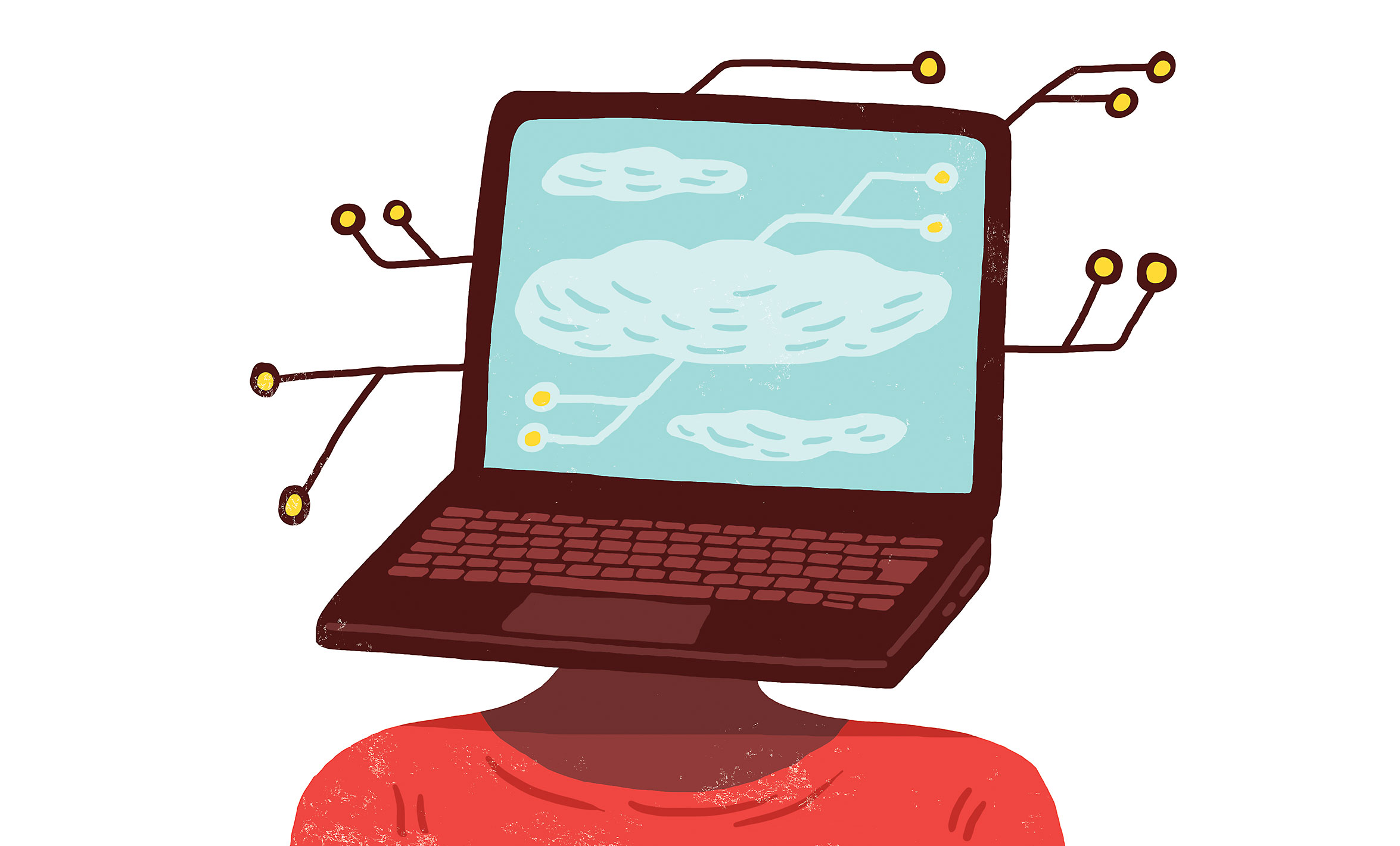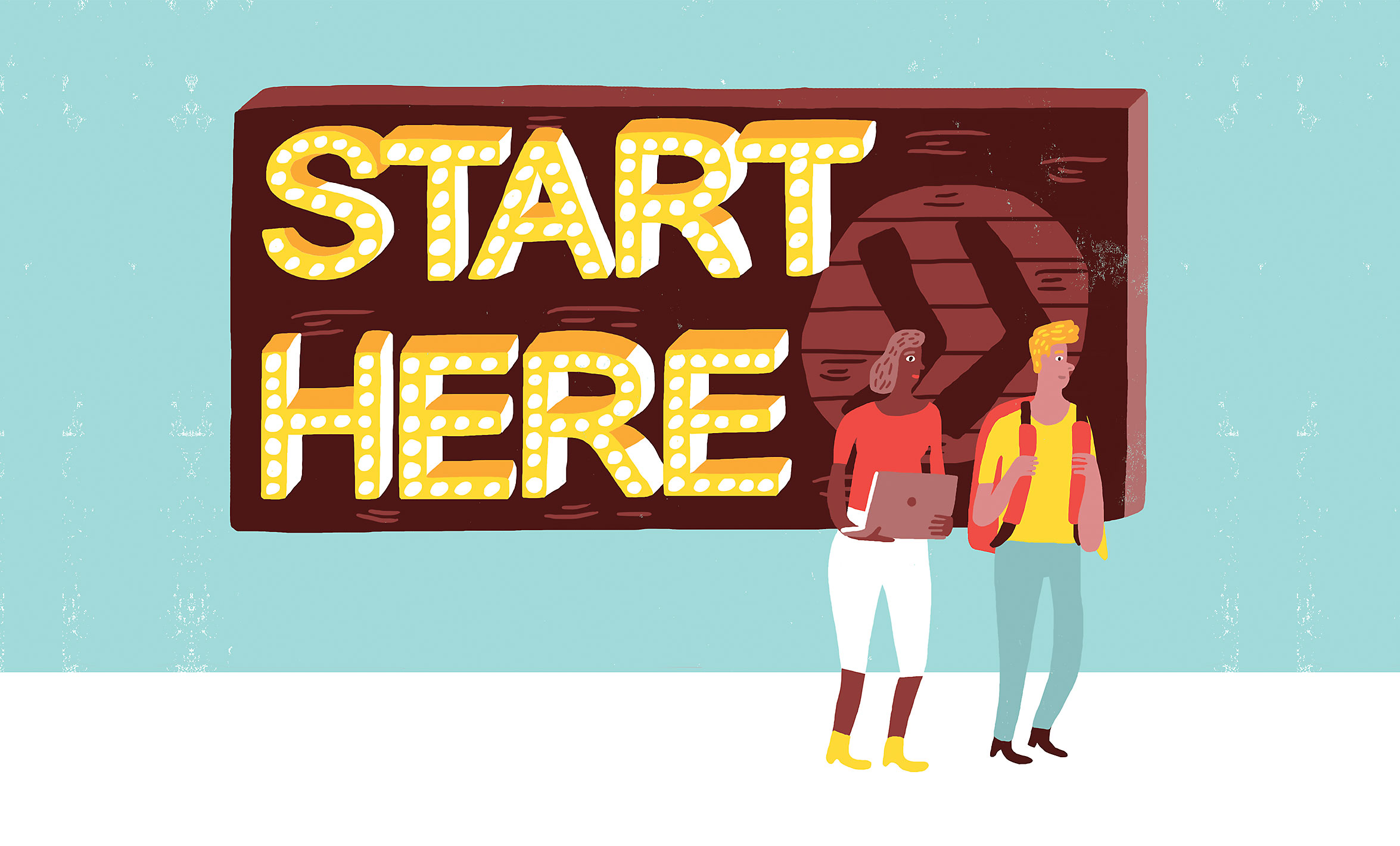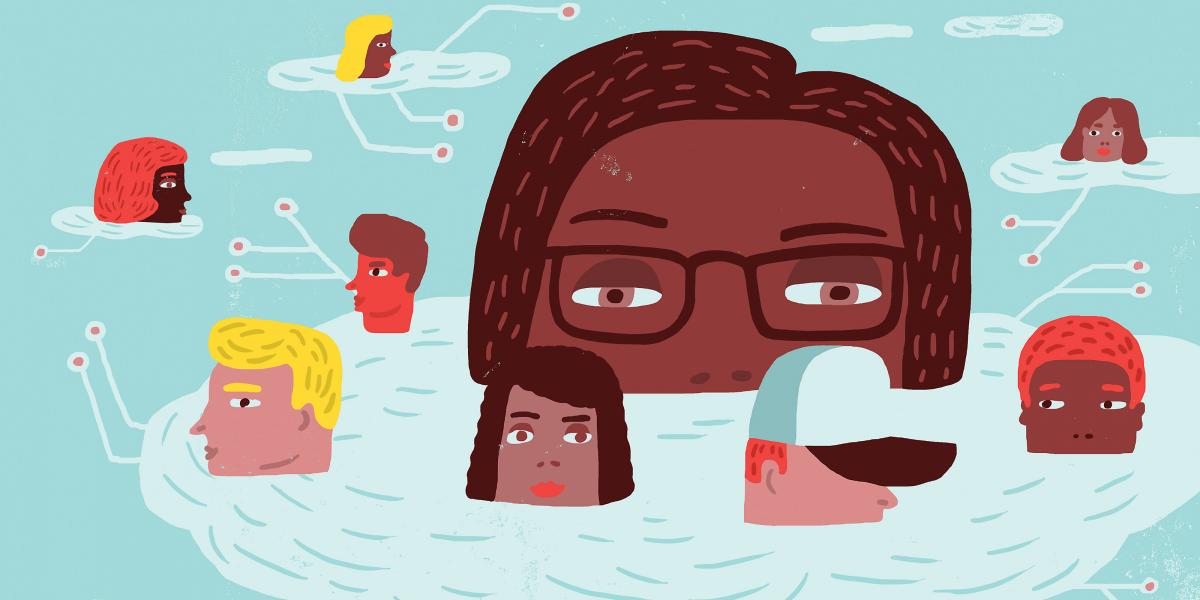Data Science Careers for Baltimore’s Underserved Community Members
With laptops, free online courses, and a startup, Biostatistics Professor Jeff Leek aims to open doors to data science careers for Baltimore youth.
Kai Lewis* cycled through a series of homeless shelters after being kicked out of their suburban Baltimore home when they came out as gay at age 17. On better days, they stayed on a friend’s couch or shared a run-down apartment with roommates. In bleaker times, they slept in parks or on benches, bedding down on top of their work clothes to prevent them from being stolen.
Lewis, now 23, had always dreamed of going to college. But without family support, they instead moved through a series of unfulfilling jobs—lugging boxes in a warehouse, serving food at conventions—and doing whatever they could to survive.
Last year, a shelter social worker told Lewis about a new program offered by the Bloomberg School. Young adults with little more than a GED, an interest in technology, and a drive to succeed could enroll in data science classes for free and, unbelievably, receive a stipend and a laptop to complete the 14-week program. Lewis was accepted to the inaugural class of Cloud-Based Data Science Plus, or CBDS+, a program conceived of and led by Biostatistics professor Jeffrey Leek, PhD, MS.
“It was intense, but it was also exciting,” says Lewis, their eyes thoughtful behind horn-rimmed glasses. Biostatistics postdocs Aboozar Hadavand, PhD, and Shannon Ellis, PhD, who helped create the online course content, led in-person tutoring, explaining the intricacies of parsing data while imparting the basics of career networking, preparing a resumé, and job hunting.
Now Lewis, who completed the program in the fall of 2018, is one of five CBDS+ graduates who work at Problem Forward, a venture that Leek started with a business partner; the startup is housed within Johns Hopkins’ tech incubator, FastForward, on the East Baltimore campus. Lewis and their colleagues earn about $40,000 annually—an impressive starting salary for someone without a college degree—with excellent benefits and a supportive community of colleagues.
Data-Driven Change
Leek conceived of CBDS+ in 2016. He was troubled by the stark economic and social inequalities in Baltimore, particularly in the neighborhoods surrounding the East Baltimore campus. He had already taught millions of people basic data science through a series of free MOOCs (massive open online courses) that he created with Biostatistics Department colleagues. Most of the people who enrolled in the classes through the online platform Coursera already had a college degree and a well-paying job. What if there were a way to tailor the classes to meet the needs of young people in East Baltimore?
“If you ask any Biostatistics doctoral candidate why they’re here, they’ll say they know a bit of math and they want to change the world,” Leek says. “We realized that we could start by changing the world right outside our door. We wanted to provide education and job tools to people who historically hadn’t had them.”
Data science—the work of sorting, organizing, and gleaning insights from big data—is one of the fastest growing careers in the U.S., with more than 360,000 jobs expected to be created in 2020, for a total of 2.7 million positions, according to a recent report by IBM. A 2018 LinkedIn report found more than 150,000 unfilled data science positions around the country. While many of these jobs require advanced degrees, Leek says much of the basic work could be done by people who complete his suite of online courses.
Leek decided to create a program that could open the field of data science to people without college degrees. It has the potential to be a remarkable public health intervention—empowering people with limited financial and educational resources to join the middle class. In addition to data science courses, the scholars would receive tutoring, a $2,500 stipend, and wraparound social services—the “plus” of CBDS+. The program appears to be the first in the nation to prepare people from historically underserved communities for data science careers, Leek says. Residents of the neighborhood surrounding Hopkins’ East Baltimore campus have a median income under $20,000—per family—sharply limiting their access to health care, education, food, and adequate housing. The program would introduce students to a growing field, equip them with skills for success, and enable them to find jobs that could more than double their household income.

"This is the stepping stone I need to further my career. … I know it’s going to be useful in my next steps.”
—Davon Person, 24, CBDS+ student who hopes to start his own business
“To have multiple families within a community experience that same type of increase puts the community, and the city, in a better position,” says Ashley K.G. Johnson, administrator of the CBDS+ program. “Instead of hoping that resources and information trickle down to those who need it most, we’re optimizing the talent, resilience, and drive of our city’s youth and working to create a stronger foundation for Baltimore.”
The program would also bring much-needed diversity to the tech industry, says Leek. “Tech affects all of our lives in so many ways, from social media platforms to how government services are delivered,” he says. “It’s important that everyone gets a seat at that table. Meanwhile, it’s hard for someone from East Baltimore to get to a tech job. If we were [in] San Francisco or New York, it would be easy to take public transportation to a tech job, but that’s not the case in Baltimore. We decided to bring the tech jobs to the community.”
Leek decided to start small and slowly scale the program. He partnered with the YO (Youth Opportunity) Baltimore program of the Historic East Baltimore Community Action Coalition (HEBCAC), a decades-old nonprofit serving the area near the East Baltimore campus. The first CBDS+ cohort had just two students—Lewis and one other—who started the coursework in the summer of 2018.
Solving Problems, Moving Forward
The students receive a Chromebook, a lightweight and inexpensive laptop. They save their work to the cloud, enabling them to bypass the limits of the laptop’s memory. They work through most of their courses on their own, then meet in a conference room above Problem Forward twice a week with their tutors. If students don’t have internet access at home, the program will cover the cost of it. They can also work from the Starbucks in the building where Problem Forward is located, a public library, or any place with Wi-Fi.
Leek is in the process of creating a study to follow program participants over the next five years, looking at their incomes, health, and educational choices in order to see which aspects of the program are most effective.
Johnson, a longtime Biostatistics Department employee, jumped at the opportunity to become the CBDS+ program administrator last fall. “I’m a Baltimore native and a graduate of Baltimore City Public Schools, which is part of why I love the program,” she says.
Johnson serves as an adviser, advocate, and surrogate big sister to the students, guiding them through all aspects of the program. On a recent afternoon, she and Hadavand, CBDS+ curriculum lead, walked the third cohort of students through the process of using Google documents and spreadsheets.
The four students were in the second week of the program and had already completed several course modules on their own time. “They practice on their own, and then they come here to polish and perfect,” said Hadavand.
Johnson explained to the students how to create data headers that would make it easier to organize and search. “Make sure you give your sheet a name,” she told the class, bending over the laptop of one student seeking help.
For scholars who attended crowded urban schools, the personal attention is unlike anything they have experienced. Aure’on Allen, 20, applied for the program on the recommendation of her YO employment advocate and quickly discovered she has an aptitude for data science.
“I was always interested in technology, but I didn’t really know what data science was,” says Allen. She had been racing through the modules and was already several lessons ahead of her colleagues. Ultimately, Allen hopes to go to college and graduate school for embryology. In the meantime, a job in data science could help her provide for her two children.

“I really want to put my full potential into this. My mindset is to change the world around me.”
—Anthony Franklin, 23, CBDS+ graduate and data science analyst at Problem Forward
The criteria for joining the CBDS+ program are flexible, Johnson says. There are no prerequisite courses or minimum GPA. Students need to be able to read and do math on a 10th-grade level. They must be committed to the program and self-motivated. “We want to be open to as many people as we can,” she says.
Even without a formal background in computer science, the students grasp the material quickly, Leek says. “Young people grow up surrounded by technology, so they already have an aptitude for it,” he says. “That makes our job a lot easier.”
The larger challenge is ensuring students have access to the social supports they need to be able to learn the material, he says. Students may need help securing child care, health care, housing, employment, or mental health services. Counselors with HEBCAC’s YO program assist with most of these needs. Even so, participants still face their fair share of obstacles: Two of the four members of the third cohort wound up having to leave this summer for personal reasons.
“The job has really helped me stand on my own feet and be able to take care of my family.”
—Andre Davis, 27, CBDS+ graduate and data science analyst at Problem Forward
At the conclusion of the program, scholars create a final data project and present it to their fellow students, program staff, family, and friends during the closing ceremony. The week that follows is dedicated to what Hadavand calls an optional “job-hunting boot camp.” The students polish their resumés, create LinkedIn profiles, and practice interview skills before applying to their first data science jobs.
The combination of data science expertise, job search skills, and support services seems to be a winning formula. Of the six students who had completed the program by last summer, five were employed by Problem Forward, the company Leek founded with a longtime friend, Jamie McGovern, to both provide jobs for CBDS+ graduates and serve clients’ data needs. Under the supervision of lead data scientist Kenny Morales, MS ’18, the CBDS+ graduates organize and analyze data for major marketing firms, biotechnology startups, pharmaceutical logistics companies, consulting firms, and other clients. The company serves as a sort of launchpad for the graduates’ careers, providing valuable experience to help them land higher-paying jobs in the future.
Problem Forward also manages to turn a profit, Leek says. He and McGovern founded the company with a small initial investment and it must remain profitable to stay afloat.
The employees receive two weeks of vacation, sick time, floating holidays, health insurance, and matching 401(k) contributions. On an afternoon in midsummer, they pored over data with an easy camaraderie, batting around ideas for classifying and categorizing data. The office is sleek and stylish, accented by vintage lanterns and eclectic furniture. Large letters studded with lightbulbs spell out “START HERE.”
Kai Lewis was working on a project with Anthony Franklin, 23. The Baltimore resident graduated from Shippensburg University in Pennsylvania with a degree in sociology last year, but he was making little more than minimum wage as a youth mentor before he started the CBDS+ program.
“It was like learning a new language,” Franklin said of the data skills. “There was a big learning curve, but we have a great support system here.”
Ultimately, the goal of both the CBDS+ program and Problem Forward is to create opportunities for those who have had few in the past, says Leek. He is in talks to expand the program with local high schools and community colleges. He has also met with people from other cities who are interested in replicating CBDS+.
Leek hopes to train 100 people for data science careers through CBDS+ over the next five years. The bigger challenge, he says, will be growing Problem Forward so the company can continue to provide opportunities for program grads. He hopes to partner with more businesses, nonprofits, and government agencies as news of the program spreads.
For Lewis, the program and the job at Problem Forward have brought the stability they’ve craved for so long. They now rent a comfortable apartment, are saving money, and, in their free time, volunteer as an advocate for homeless youth. They plan to enroll in college courses in data science.
“I’ve always wanted to change the world,” says Lewis. “Now I see there’s a way to do that with data science.”
